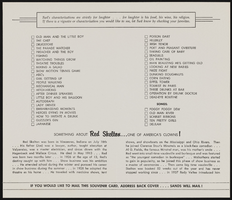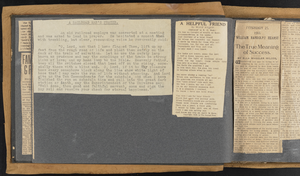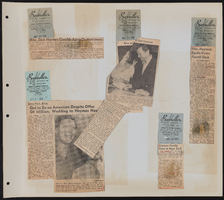Search the Special Collections and Archives Portal
Search Results
Edwin "Tony" Wuehle oral history interview
Identifier
Abstract
Oral history interview with Edwin "Tony" Wuehle conducted by David Schwartz on December 21, 2006 for the Boyer Early Las Vegas Oral History Project. In this interview, Wuehle discusses his early life in Hettinger, North Dakota and his career as an educator. He recalls his first experiences playing poker, participating in home poker games while living in Michigan’s Upper Peninsula, and using a pseudonym as a player. Wuehle then talks about writing a book, founding the Gamblers Book Club Press in Las Vegas, Nevada, and writing for religious publications. Later, Wuehle explains the tension between participating in religion and playing poker. He describes Las Vegas poker rooms during the 1960s and 1970s and shares his thoughts on online poker. Lastly, Wuehle discusses why casinos use prop players and his efforts to organize a poker tournament to raise funds for Bay de Noc Community College in Michigan.
Archival Collection

Christine Szukala oral history interview: transcript
Date
Archival Collection
Description
Oral history interview with Christine Szukala conducted by Bridgette Foote on November 12, 2021 for Reflections: The Las Vegas Asian American and Pacific Islander Oral History Project. Christine shares her family history and the story of her Thai mother and American Air Force father who met in Thailand and married before moving to the United States in 1970. She talks about her upbringing in Las Vegas, Nevada near Nellis Air Force base with her six siblings. Christine discusses her beliefs of how her newly immigrated mother adapted to American life, including altering her recipes to fit her husband's taste and reducing her visits to nearby Buddhist temples.
Text
Audio recording clip of interview with Rosemary Lynch by Suzanne Becker, June 8, 2004
Date
Archival Collection
Description
Sound
Edward Baca oral history interview
Identifier
Abstract
Oral history interview with Edward Baca conducted by Claytee D. White on January 28, 2016 for the Boyer Early Las Vegas Oral History Project. Baca opens his interview describing his parents and his youth in Wyoming. He then discusses moving to Bryce, Utah in the 1940s, his career in coal mining, and the process of removing coal from the mine. Baca describes his brief time working for the federal government, going to trade school to learn morse code, and working for the railroad. He then talks about switching careers to to work as an air conditioning insulator, and moving to Las Vegas, Nevada in 1969. Baca then describes how he found religion, his efforts to learn more about Christianity, and forming a ministry where he preaches. He discusses his Christian radio program, his singing ministry, and his efforts to save a Christian radio station from closing. Lastly, Baca discusses his religious music albums, touring in a religious music group, and faith healing.
Archival Collection

Transcript of interview with Ron Lawrence by Dennis McBride, June, July and August 1997
Date
Archival Collection
Description
Ron Lawrence is one of the busiest people in the gay community, so I want him to know how much I appreciate his reserving time for me so that I could complete this oral history interview. The importance of his work toward the well-being of the gay community in Las Vegas cannot be measured, and much of what he's accomplished and otherwise made possible will live long after he leaves us. With Ron's consent to this interview, our knowledge of Nevada's gay history is greatly enriched and our record preserved.
Text





